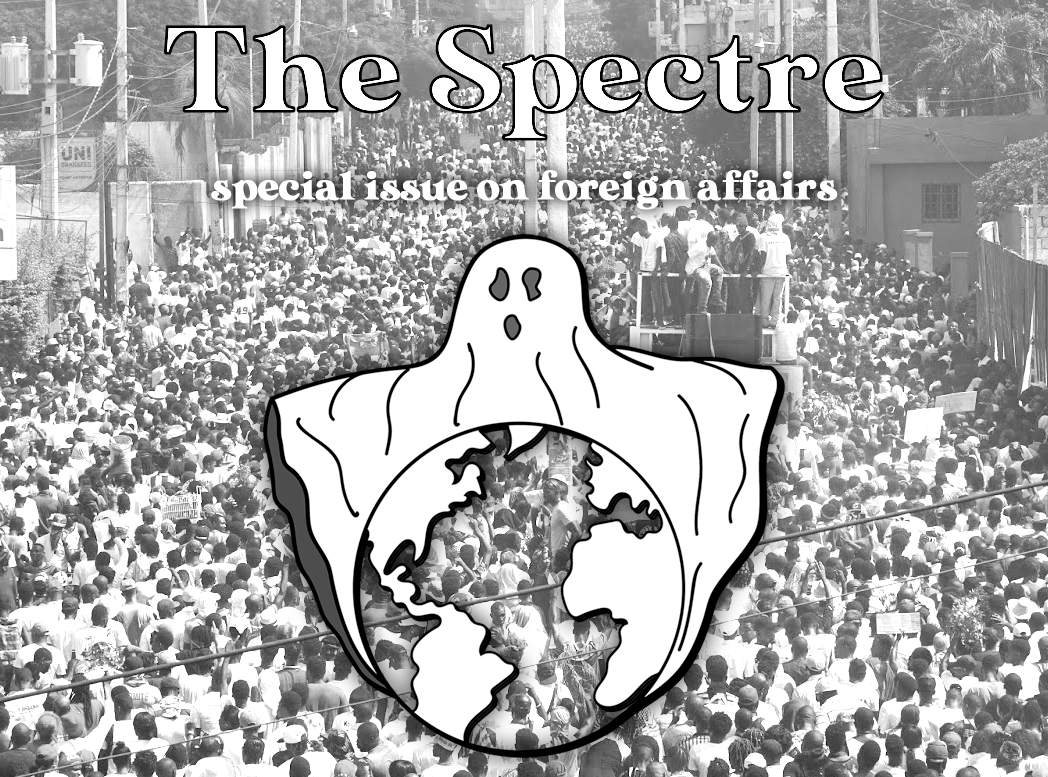By Torin Record-Sand, Editor-in-Chief
It’s important to realize that the struggle against capitalism cannot, in the current era, be confined to one country. Capitalism has always been, to some degree, an international process — but now, more than ever, the very necessities of our life come to us through immensely complex networks of trade and exploitation.
As cliché as it may be, think of the phone you likely own. It’s dependent upon a vast network of countries to produce the materials, process them, turn them into individual parts, and then finally to manufacture it. Some of these countries are at the higher end: “first world” countries often produce specific technological commodities, like processors. But these processors are not conjured from thin air: the precious metals which comprise them come from mineral-rich “third world” countries. The U.S., throughout its history, has installed bloody and despotic regimes which give capitalist resource extraction firms free reign to hold workers hostage, in squalid conditions, in order to maximize profit. In fact, up until the 2010 Dodd-Frank act, the United States had no process which forced corporations to audit where their materials came from.
What this points to is that, while we may commonly think that colonialism and imperialism are the remnants of a distant past, in many ways they aren’t. Of course, the U.S. is no longer in the business of creating colonies or empires in the traditional sense of the word. Yet, capitalism has enabled the emergence of colonialist, imperialist structures, in subtler and more insidious ways.
Modern, global capitalism has created a system which automates and instantiates colonial and imperial structures without literal violence or conquest. All it needs to do is simply run the markets. Consider the so-called “Washington Consensus” — the agreement between the International Monetary Fund, the World Bank, and the U.S. Department of Treasury. These institutions make loans and deals with developing countries dependent upon certain requirements — the opening of trade borders, the production of certain materials, fiscal austerity, the ability to allow corporations to freely exploit your own land and resources, and finally, the protection and defense of capital against socialist governments. If you’re a poor country and you need the cash, it’s an offer you can’t refuse. And if you just so happened to end up in debt to the most powerful governments and institutions on the planet, it was a “fair deal” you agreed to, right?
Why, then, would a country like the United States ever need to go out and conquer in the name of expanding its borders? In its quest to expand the power of the unholy dollar, it has all that it wants. The “completely free and consensual” market need only work its magic.
This isn’t to say that the U.S. hasn’t decided to rough up some countries along the way. Consider the many bloody military interventions throughout the Cold War, all in the name of literally defending capitalism — Korea, Afghanistan, and, of course, Vietnam. Consider, too, neoliberalism’s most infamous experiment in Chile, the reign of Augusto Pinochet, who brutally murdered the remnants of the left in Chile and installed free market capitalism in place of Salvador Allende’s socialism. Many have long suspected that the U.S. government enabled Pinochet’s coup, either tacitly or actively, but thanks to the ongoing work of historians, we are learning that the CIA and the Nixon administration spread anti-Allende propaganda, undermined Chile’s economic stability, and provided material support to Pinochet’s military on the condition that they staged a coup! And as a wholesome welcoming gift, the U.S. sent along some of the University of Chicago’s most talented free market economists to Chile, ensuring the transition from socialism went nice and smoothly.
What we see is that global capital is dependent upon keeping everything in its right place. When the Global South get a little too rowdy, capital has a full toolbox to tighten those loose screws: debt, politics, and when needed, physical force. The products of our everyday life are traded in blood as much as they are in dollars; this is not by accident, but by design.
In the current world system of neoliberalism, each country, and even each region, forms a crucial piece in the puzzle. But what we must remember is that when even a single piece goes missing, the whole thing can fall apart, and bring the opportunity for something new. The system is fragile. Without crucial resources, without ever expanding trade and supply lines, without global exploitation, unencumbered capitalism cannot continue. As such, it is our duty to respect and support the struggle of each nation against the spread of neoliberalism and capitalism. Each struggle is crucial to our ability to imagine a new world together.

